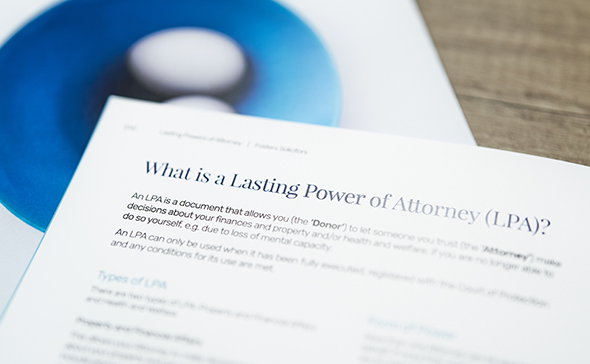FAQ: Lasting Power of Attorney
We explore some key information and answers to some frequently asked questions raised around Lasting Power of Attorney and why it’s important to have one.

What is a Lasting Power of Attorney?
A Lasting Power of Attorney (LPA) is a legal document which allows you to appoint one or more people to make decisions or act on your behalf if you are no longer able, or no longer wish to do so.
This could be a temporary situation if you found yourself temporarily incapacitated, or because of needing to make longer-term plans, for example, after being diagnosed with dementia.
There are two types of LPAs for different kinds of important life decisions:
· LPA for financial decisions – this includes decisions such as buying and selling property, investing your savings and paying everyday bills.
· LPA for health and care decisions – this includes decisions such as your medical treatment, where you should live and who you should have contact with.
When do I need a Lasting Power of Attorney?
Mental capacity is the ability to use and understand information to make a decision and communicate any decision made.
Although everyone hopes that they will not lose mental capacity and will never need to rely on an LPA, unfortunately some of us begin to lose our faculties sooner than we might expect.
Preparing an LPA is the best way you can have peace of mind that you will be looked after by who you want, should you begin to lose your mental capacity.
What happens if I don’t have a Lasting Power of Attorney?
If you lose your mental capacity and you don’t have an LPA in place, you may find that banks will no longer transfer money for you, and you might be unable to buy or sell property. Equally, you may no longer be able to make decisions regarding the medical treatment you receive, or whether you should move to a care home. Those that do not have an LPA are therefore often left in limbo.
Importantly, unlike where you have an LPA ready and waiting, your loved ones will be unable to assist you in such a difficult and vulnerable period of your life.
Without an LPA, if you need assistance in managing your finances or making healthcare decisions, your family or friends would have to apply for a deputyship order. This requires involvement with the Court of Protection and can be a drawn-out and expensive process, particularly in comparison to the relative simplicity of an LPA. The deputyship application process can be emotionally challenging for you and those around you, something that can be easily avoided by having an LPA in place.
What powers will my attorney have?
Attorneys must always act in your best interests and involve you in decision-making as much as possible.
Within the LPA document itself, you can set out your own personal preferences as to how you would like your attorneys to make decisions on your behalf. For example, you may prefer to invest your money in certain ways, have regular personal hygiene appointments, or not to see certain family members.
If you have a more deep-rooted belief, an LPA also allows you to set out specific instructions for your attorneys. This can be vital to uphold important personal values – a common example we see are vegetarians who instruct their attorneys to not feed them meat of any kind. This ensures that an individual can safeguard their firmly held beliefs, even at a time in their lives where they otherwise have little control over their circumstances.
Who can I appoint as an attorney?
You may appoint anybody as your attorney, provided they are at least 18 years old, have mental capacity and are not bankrupt or subject to a debt relief order.
Given that the decisions in which attorneys will be involved in could be life-changing, it is important that you appoint only those you can trust to protect your best interests.
It is for this reason that people usually appoint their spouse/partner, or very closest relatives and friends as their attorneys.
Where a client has nobody close to them that they would like to appoint as an attorney, or if they wish for their attorneys to have professional help when acting, legal practitioners are able to act as an attorney.
Here at Fosters Solicitors, we have a wealth of expertise and experience in acting as professional attorneys and understand the need to safeguard the best interests of our clients to the fullest extent, whether that is in collaboration with other attorneys or alone.
Are Lasting Powers of Attorneys safe?
In recent months there have been quite worrying case studies making the news of people fraudulently using LPAs and taking control of complete stranger’s affairs without their knowledge.
Government reform is planned to improve the system and better protect people from fraud. However, these cases highlight just how important it is to take the necessary steps to protect yourself now, by legitimately making a Lasting Power of Attorney through a qualified legal professional.
By appointing us to prepare your LPAs, you can rest assured that the necessary care is being taken to ensure that your best interests will be protected in the future.
Lasting Power of Attorney experts
If you have any further questions on LPAs or wish to seek tailored advice for your own personal circumstances, please contact our Wills, Trusts & Probate team directly on 01603 620508 or by email.

